It looks like you're using an Ad Blocker.
Please white-list or disable AboveTopSecret.com in your ad-blocking tool.
Thank you.
Some features of ATS will be disabled while you continue to use an ad-blocker.
share:
Time for a fun conspiracy theory, let's get back to the ATS basics!
So apparently a lot of people are noticing a distinct connection between Vladimir Putin and RasPutin, and if you dig around you'll discover that there seems to be a lot more to this than a mere name coincidence!! In fact, it becomes a full blown traditional Illuminati conspiracy theory!!
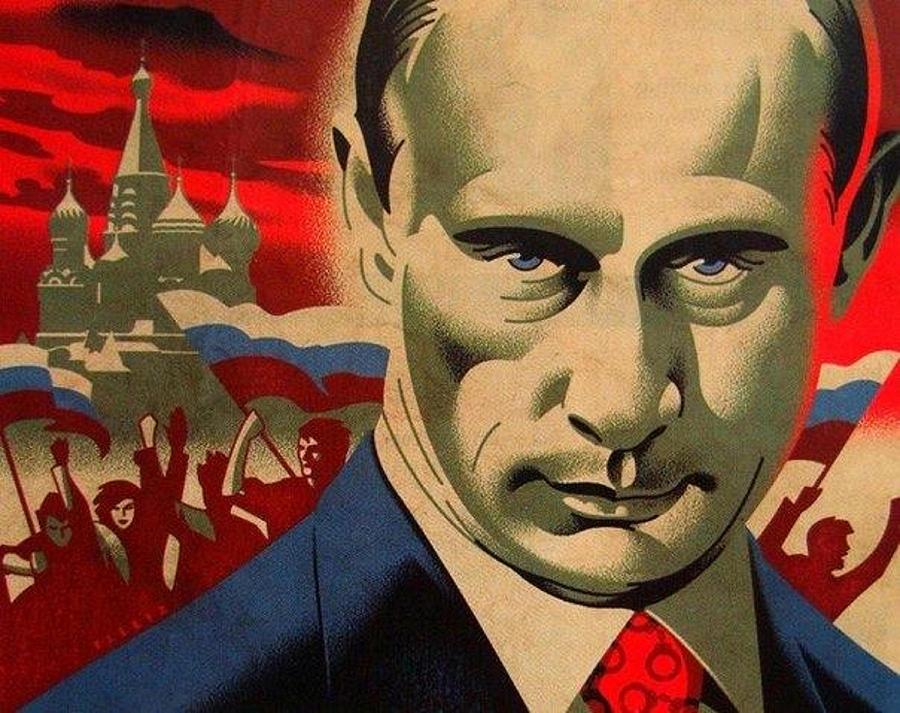
First of all, No One can seem to figure out Putin's family tree beyond his grandfather!
Did you know granddad is connected closely with Lenin and Stalin:
It would even seem that Putin is potentially from the royal Tver family, and therefore related to all royal families of Europe!
Originally cited from a 2002 article in Pravda discussing the Mysterious Genealogy of Putin,
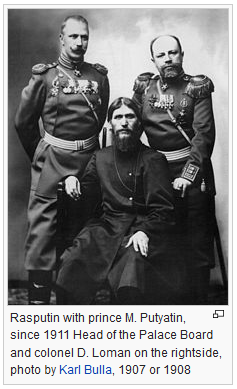
Who is Grigori RasPutin ?
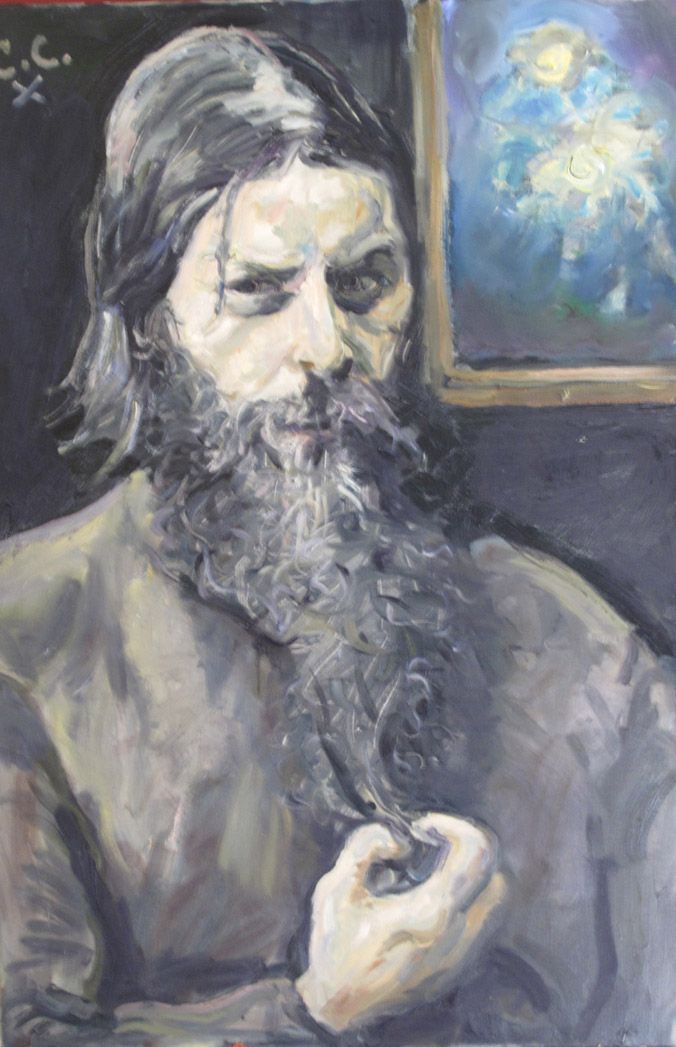
Ok so we have a Rasputin - Tver royalty - Putyanin - Putin connection.
Combine that with the suggestion that Rasputin purposely infiltrated and discredited the Tsarist government leading to the Communist overthrow, and then the apparent reinvention of the Tsarist government with Vladimir Putin - and you have a plausible conspiracy theory!
Does it make sense now that Putin uses the Tsarist symbolism as his coat of arms?
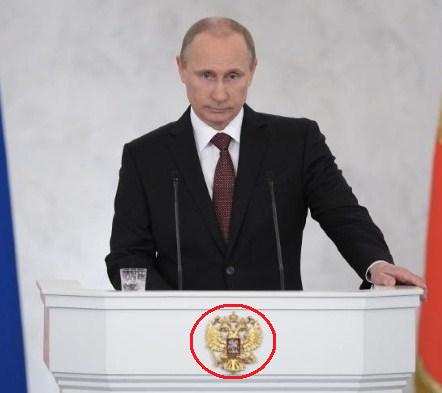
It's as if through Lenin and Rasputin that the Illuminati overthrew the rebellious Tsarist autocracy, purged Russia, and then today has been reinstalled in their own image via Vladimir Putin?
But Muzzleflash, didn't Putin promise us "I will defeat the Illuminati"?, and doesn't his intervention in Syria prove he is working against the NWO ?
Don't be naive folks, Hitler claimed he was fighting against the Illuminati, so did Jimmy Carter and Ronald Reagan. It's almost as if most of the world's most powerful people, including Trump, are "working against the Illuminati". Does anyone really believe that?
You see the actual conspiracy theory is that the Illuminati exert the most control and achieve the most success by focusing on "Identity Politics" and "Nationalist sentiments" in order to fuel the corporate takeover of all resources and to generate ample chaos and conflict that will cause the masses to clamor for their policies to be implemented. Divide and conquer! Problem Reaction Solution!
They are already in control of our minds and this entire planet, they exert maximum power, have infinite wealth, and the Internationalist World Order already exists. It's been this way for our entire lives and most of us don't even recognize it, in fact, many of you think that you are somehow defeating them by choosing a left or right paradigm and opposing the alternative side. The end game is more totalitarianism and more mind control!
Some links:
Pravda Putin genealogy article
Google's top result on the Putin - RasPutin conspiracy theory
A side bonus link showing how crazy it really gets, some people actually think Putin is the reincarnation of RasPutin himself! It's ridiculous!
Report on the wild theory going around in Russia
Fareed Zakaria, one of CNN's top shills, claims that Putin is the world's most powerful man and I don't have to remind anyone that the left claims that Russia now controls the world and the US by installing Trump as a puppet president (which is totally bunk by the way).
What I am sharing here now is the Illuminati conspiracy theory that Putin, Trump, Hillary, etc, are actually the world's power elite and that they are defacto Illuminati lieutenants and that everyone on both sides is being played - as if Rasputin himself were behind it in some seductive Svengalian deception to manipulate us all against each other while the world's resources are being stolen right before our eyes and we are being enslaved as our civil rights are being stripped one by one in this technocratic take-over.

That's Piotr Rasputin aka Colossus btw...
So apparently a lot of people are noticing a distinct connection between Vladimir Putin and RasPutin, and if you dig around you'll discover that there seems to be a lot more to this than a mere name coincidence!! In fact, it becomes a full blown traditional Illuminati conspiracy theory!!

First of all, No One can seem to figure out Putin's family tree beyond his grandfather!
Did you know granddad is connected closely with Lenin and Stalin:
Vladimir Putin’s paternal grandfather, Spiridon Ivanovich Putin (1879–1965), was a chef who at one time or another cooked for Vladimir Lenin, Lenin’s wife Nadezhda Krupskaya, and on several occasions for Joseph Stalin.
It would even seem that Putin is potentially from the royal Tver family, and therefore related to all royal families of Europe!
Originally cited from a 2002 article in Pravda discussing the Mysterious Genealogy of Putin,
Is Putin an offspring of the Tver prince? This hypothesis was getting more and more real. The name Putin is not mentioned amid the Russian names. This means that the name is of the artificial origin.
This name has appeared recently, somewhere in the middle of the 19th century. All Putins originally came from the clan of Putins from the Tver region. Illegitimate offsprings of noble families were often given cut names. For example, Russian writer Pnin was an illegitimate son of Field Marshal Repnin. There were lots of other occasions like that – Betskoy instead of Trubetskoy, Gribov instead of Griboyedov. The new names of unofficial clan branches were formed by means of deduction: a syllable was simply taken out of it.
The family book of the Tver region mentions the name of Putyanin – a clan of Russian princes. This clan gave a lot of outstanding military leaders to Russia, as well as artists, politicians and priests. This is one of the oldest clans in the Russian history. If President Putin is a descendant of the Putyatins clan, this means that Vladimir Putin has a relation to all royal families of Europe.

Who is Grigori RasPutin ?

a Russian mystic and self-proclaimed holy man who befriended the family of Tsar Nicholas II, the last monarch of Russia, and gained considerable influence in late imperial Russia.
In late 1906, Rasputin began acting as a healer for the Tsar and his wife Alexandra's son Alexei, who suffered from hemophilia and was Nicholas' only heir (Tsarevitch). At court, he was a divisive figure, seen by some Russians as a mystic, visionary, and prophet, and by others as a religious charlatan. The high point of Rasputin's power was in 1915, when Nicholas II left St Petersburg to oversee Russian armies fighting World War I, increasing both Alexandra and Rasputin's influence. As Russian defeats in the war mounted, however, both Rasputin and Alexandra became increasingly unpopular. In the early morning of 30 December [O.S. 17 December] 1916, Rasputin was assassinated by a group of conservative noblemen who opposed his influence over Alexandra and the Tsar.
Some writers have suggested that Rasputin helped discredit the tsarist government, and thus helped precipitate the Russian Revolution and the fall of the Romanov dynasty. Very little about Rasputin's life and influence is certain, however, as accounts have often been based on hearsay, rumor, and legend.
Ok so we have a Rasputin - Tver royalty - Putyanin - Putin connection.
Combine that with the suggestion that Rasputin purposely infiltrated and discredited the Tsarist government leading to the Communist overthrow, and then the apparent reinvention of the Tsarist government with Vladimir Putin - and you have a plausible conspiracy theory!
Does it make sense now that Putin uses the Tsarist symbolism as his coat of arms?

It's as if through Lenin and Rasputin that the Illuminati overthrew the rebellious Tsarist autocracy, purged Russia, and then today has been reinstalled in their own image via Vladimir Putin?
But Muzzleflash, didn't Putin promise us "I will defeat the Illuminati"?, and doesn't his intervention in Syria prove he is working against the NWO ?
Don't be naive folks, Hitler claimed he was fighting against the Illuminati, so did Jimmy Carter and Ronald Reagan. It's almost as if most of the world's most powerful people, including Trump, are "working against the Illuminati". Does anyone really believe that?
You see the actual conspiracy theory is that the Illuminati exert the most control and achieve the most success by focusing on "Identity Politics" and "Nationalist sentiments" in order to fuel the corporate takeover of all resources and to generate ample chaos and conflict that will cause the masses to clamor for their policies to be implemented. Divide and conquer! Problem Reaction Solution!
They are already in control of our minds and this entire planet, they exert maximum power, have infinite wealth, and the Internationalist World Order already exists. It's been this way for our entire lives and most of us don't even recognize it, in fact, many of you think that you are somehow defeating them by choosing a left or right paradigm and opposing the alternative side. The end game is more totalitarianism and more mind control!
Some links:
Pravda Putin genealogy article
Google's top result on the Putin - RasPutin conspiracy theory
A side bonus link showing how crazy it really gets, some people actually think Putin is the reincarnation of RasPutin himself! It's ridiculous!
Report on the wild theory going around in Russia
Fareed Zakaria, one of CNN's top shills, claims that Putin is the world's most powerful man and I don't have to remind anyone that the left claims that Russia now controls the world and the US by installing Trump as a puppet president (which is totally bunk by the way).
What I am sharing here now is the Illuminati conspiracy theory that Putin, Trump, Hillary, etc, are actually the world's power elite and that they are defacto Illuminati lieutenants and that everyone on both sides is being played - as if Rasputin himself were behind it in some seductive Svengalian deception to manipulate us all against each other while the world's resources are being stolen right before our eyes and we are being enslaved as our civil rights are being stripped one by one in this technocratic take-over.

That's Piotr Rasputin aka Colossus btw...
Oh and if you're ever bored and want some good fiction to burn some time, try this comic out:
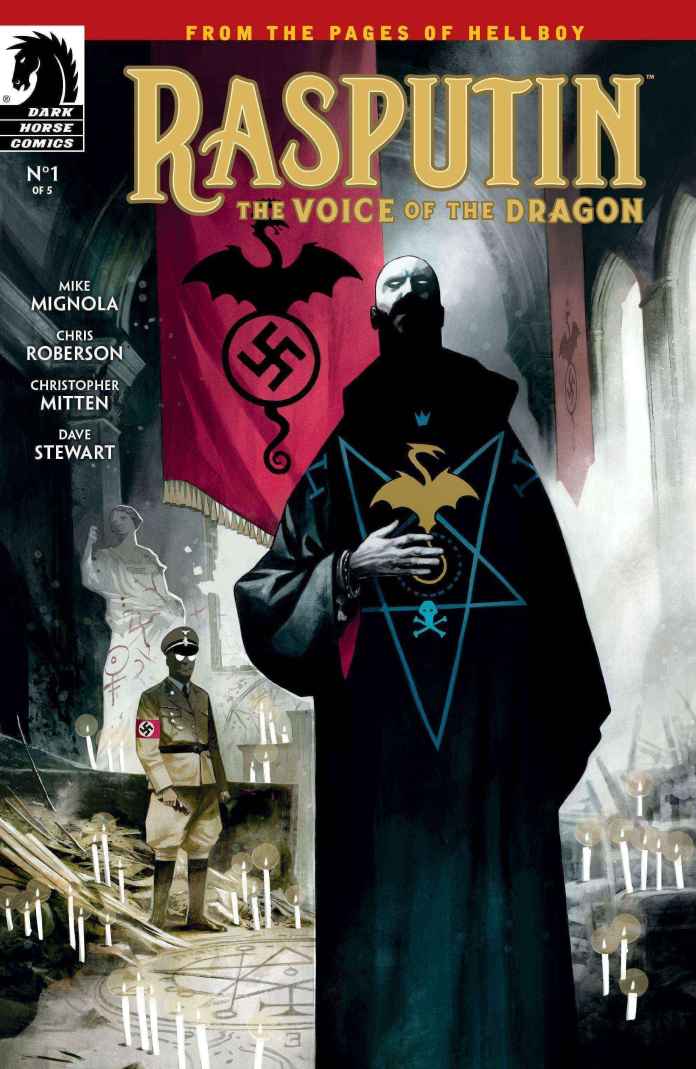

Thought you guys would get a kick outta this one.
Hopefully everyone enjoys it.
ATS has been in some need of a good ol conspiracy theory lately so here ya go!
Hopefully everyone enjoys it.
ATS has been in some need of a good ol conspiracy theory lately so here ya go!
a reply to: muzzleflash
I love this thread already and I've only had the privilege or reading for 2 minutes (I am a slow reader... and I re-read things multiple times sometimes).
Cannot wait to dive down this rabbit hole !!
I love this thread already and I've only had the privilege or reading for 2 minutes (I am a slow reader... and I re-read things multiple times sometimes).
Cannot wait to dive down this rabbit hole !!
originally posted by: muzzleflash
Thought you guys would get a kick outta this one.
Hopefully everyone enjoys it.
ATS has been in some need of a good ol conspiracy theory lately so here ya go!
Good thread here, muzzleflash. I like the connections you put together and the conclusions. Just by coincidence I had recently watched some youtube material on WW1 and the American Expeditionary Forces:Siberia. As I was going through the various videos I was struck with a strange idea: that Tzar Nicholaus and his family were not murdered in 17 July 1918, they were kidnapped away and lived out their lives!
BTW, we just missed the 100th anniversary of the event - I didn't see anything about it in any of my news feeds. maybe you did?)
So 17 July 1918 was the 100th anniversary of the Tzar Nicholas Romanov regicide. For background only: [url=https://en.wikipedia.org/wiki/Execution_of_the_Romanov_family[/url]
If your theory stands scrutiny then a reemergence of the Romanov dynasty might come to be initiated through someone with the qualifications of a Vladimir Putin, a very wealthy plutocrat, who having some royal blood connections, might be a member of a loyalist or royalist rebellion seeking to reseat the Romanov's as Russian autocracy after a century of 'experimentation' with other governmental systems.
Here is something to think about: 100 years ago it was trivial to move about the world with fake identification taking boats, trains, zeppelins, whatever. A man and his entire family could easily change his identity. You alluded to this when you mentioned how some Russian names are changeable under some circumstances. Well, this was easily done in the early 20th century.
Consider this: Nicky and his family don't get murdered in the basement at Ipatiev House in 17 July 1918, they are put into a witness protection program by loyal royalists.... and 100 years later Vladimir Putin comes to power and he is the representative of these descendants of the royal Romanov dynasty.
This could mean that there are actual Romanov's (direct descendants of Nicky) working in the behind the scenes of world politics today. I don't wanna hijack your thread but I'm having an odd feeling of deja vu when it comes to RasPutin/Putin. I really think your angle on this deserves a whole lotta more digging.
edit on 8/17/2018 by SayonaraJupiter because: fix link
muzzleflash, what you are suggesting here is that a royal-blooded regime or dynasty could and would hoax it's own regicide only to return 100 years
later to take the power back. Please forgive me if I have misunderstood your OP. I personally think that your theory and line of inquiry deserves much
more research.
Were Lenin, Stalin, Brezhnev, Gorbachev, Yeltsin and all the rest of them puppets of the divine shadow of Romanov descendants? If the Romanov's decided to fake their own demise to avoid a regicide well, I don't blame them.
The Romanov/RasPutin theory would be an example of a 'good hoax'. The players go along with the hoax because they believe that the outcome is 'good' and are willing to sacrifice for that 'good'.
Et Voila! You have a conspiracy.
Were Lenin, Stalin, Brezhnev, Gorbachev, Yeltsin and all the rest of them puppets of the divine shadow of Romanov descendants? If the Romanov's decided to fake their own demise to avoid a regicide well, I don't blame them.
The Romanov/RasPutin theory would be an example of a 'good hoax'. The players go along with the hoax because they believe that the outcome is 'good' and are willing to sacrifice for that 'good'.
Et Voila! You have a conspiracy.
a reply to: SayonaraJupiter
Thank you for your really cool responses!
I think it's very interesting that you were having similar notions and kinda went down similar trains of thought about this topic. It's sorta an obvious possibility if you really start thinking about it. I'm sure that a lot more people have considered it (that the Romanov's might have secretly escaped).
I do think this requires way more research and there are a lot of aspects to it, and I was considering before posting the thread that I could look deeper into it but that could take weeks or months and I just felt the need to get this out there before I lost interest in it.
Also I am totally cool with anyone sharing research or discoveries or theories here in this thread if they come up with anything weird/fascinating/mind blowing. If it's significant and worth it's own thread than I'd request to at least post a link here in this one so I (and any random readers) will be able to know about it and go read it.
Thank you for your really cool responses!
I think it's very interesting that you were having similar notions and kinda went down similar trains of thought about this topic. It's sorta an obvious possibility if you really start thinking about it. I'm sure that a lot more people have considered it (that the Romanov's might have secretly escaped).
I do think this requires way more research and there are a lot of aspects to it, and I was considering before posting the thread that I could look deeper into it but that could take weeks or months and I just felt the need to get this out there before I lost interest in it.
Also I am totally cool with anyone sharing research or discoveries or theories here in this thread if they come up with anything weird/fascinating/mind blowing. If it's significant and worth it's own thread than I'd request to at least post a link here in this one so I (and any random readers) will be able to know about it and go read it.
I'm sure a lot of people are related to Rasputin. The dude traveled all over Russia and bedded women everywhere he went.
I'm not even sure how he managed that with his looks but it happened.
I'm not even sure how he managed that with his looks but it happened.
it's all about what's in your blood
look at the ancient mythological stories of kings and giants and things like that, it's all about those bloodlines
look at the ancient mythological stories of kings and giants and things like that, it's all about those bloodlines
a reply to: muzzleflash
Putin related to Rasputin?
Would that make Marina Abramovich his 'family' operation?
I've heard similar stories is why. Would explain both their civically distasteful behaviors..
Putin related to Rasputin?
Would that make Marina Abramovich his 'family' operation?
I've heard similar stories is why. Would explain both their civically distasteful behaviors..
originally posted by: Fehrie
I'm sure a lot of people are related to Rasputin. The dude traveled all over Russia and bedded women everywhere he went.
I'm not even sure how he managed that with his looks but it happened.
No kidding... the guy was a total weirdo lol.
originally posted by: muzzleflash
originally posted by: Fehrie
I'm sure a lot of people are related to Rasputin. The dude traveled all over Russia and bedded women everywhere he went.
I'm not even sure how he managed that with his looks but it happened.
No kidding... the guy was a total weirdo lol.
Not about weirdos, but actual conquerors, not sneaky behind-tha-scenes 'ish like Rasputin, lil-Wormtongue mofos.. but man, look up tha stats on Genghis Khan sometime. Can't remember off tha top of my head, but somethin like 75% of Asia n 40% worldwide is blood-related to him. Whatta forceful stud! :p
a reply to: Neil4No1
Descent from Genghis Khan
and...
Descent from Genghis Khan
Descent from Genghis Khan (Mongolian: Алтан ураг Altan urag, meaning "Golden lineage"), generally called Genghisids, is traceable primarily in Mongolia, India, China, Russia, Southeast Asia and the Middle East.[1] His four sons and other immediate descendants are famous by names and by deeds. Later Asian potentates attempted to claim descent from the Borjigin even on flimsy grounds, such as was considered Mongol matrilineal descent. In the 14th century, valid sources (heavily dependent on Rashid-al-Din Hamadani and other Muslim historians) all but dried up. With the recent popularity of genealogical DNA testing, a larger and broader circle of people started to claim descent from Genghis Khan.
Zerjal et al. (2003) identified a Y-chromosomal lineage present in about 8% of the men in a region of Asia"stretching from northeast China to Uzbekistan" (about 0.5% of the world total), which would be around 16 million men at the time of publication, "if [Zerjal et al's] sample is representative."
and...
Genghis later took about 500 secondary wives and "consorts", but Börte continued to be his life companion. He had many other children with those other wives, but they were excluded from succession, only Börte's sons being considered to be his heirs. However, a Tatar woman named Yisui, taken as a wife when her people were conquered by the Mongols, eventually came to be given almost as much prominence as Börte, despite originally being only one of his minor wives.
a reply to: muzzleflash
Ha! Legends can never be destroyed, they merely grow stronger! :p
Thanks, btw.
Ha! Legends can never be destroyed, they merely grow stronger! :p
Thanks, btw.
Very interesting.
Also worth remembering;
Tsar Nicholas was the first cousin of King George V of England, and they all are of paternal German descent.
Also worth remembering;
Tsar Nicholas was the first cousin of King George V of England, and they all are of paternal German descent.
new topics
-
Let's talk planes.
General Chit Chat: 5 hours ago -
January 6th report shows disturbing trend (nobody is shocked)
US Political Madness: 7 hours ago -
Inexplicable military simulation - virtual reality showdown in the night..
The Gray Area: 7 hours ago -
The Truth about Migrant Crime in Britain.
Social Issues and Civil Unrest: 8 hours ago -
Trudeau Resigns! Breaking
Mainstream News: 10 hours ago -
Live updates: Congress meets to certify Trump's presidential election victory
US Political Madness: 11 hours ago -
Gravitic Propulsion--What IF the US and China Really Have it?
General Conspiracies: 11 hours ago -
Greatest thing you ever got, or bought?
General Chit Chat: 11 hours ago
top topics
-
Trudeau Resigns! Breaking
Mainstream News: 10 hours ago, 25 flags -
January 6th report shows disturbing trend (nobody is shocked)
US Political Madness: 7 hours ago, 20 flags -
Live updates: Congress meets to certify Trump's presidential election victory
US Political Madness: 11 hours ago, 12 flags -
The Truth about Migrant Crime in Britain.
Social Issues and Civil Unrest: 8 hours ago, 10 flags -
Gravitic Propulsion--What IF the US and China Really Have it?
General Conspiracies: 11 hours ago, 9 flags -
Let's talk planes.
General Chit Chat: 5 hours ago, 4 flags -
Greatest thing you ever got, or bought?
General Chit Chat: 11 hours ago, 3 flags -
Inexplicable military simulation - virtual reality showdown in the night..
The Gray Area: 7 hours ago, 2 flags
active topics
-
January 6th report shows disturbing trend (nobody is shocked)
US Political Madness • 42 • : BingoMcGoof -
Trudeau Resigns! Breaking
Mainstream News • 64 • : rickymouse -
Trump says ownership of Greenland 'is an absolute necessity'
Other Current Events • 65 • : BingoMcGoof -
Let's talk planes.
General Chit Chat • 7 • : rickymouse -
Democrats Introduce Bill That Will Take Away Donald Trumps Secret Service Protection
2024 Elections • 77 • : WeMustCare -
OK this is sad but very strange stuff
Paranormal Studies • 8 • : rickymouse -
Live updates: Congress meets to certify Trump's presidential election victory
US Political Madness • 18 • : WeMustCare -
Judge rules president-elect Donald Trump must be sentenced in 'hush money' trial
US Political Madness • 30 • : xuenchen -
Musk calls on King Charles III to dissolve Parliament over Oldham sex grooming gangs
Mainstream News • 197 • : Freeborn -
Candidate TRUMP Now Has Crazy Judge JUAN MERCHAN After Him - The Stormy Daniels Hush-Money Case.
Political Conspiracies • 2181 • : WeMustCare

